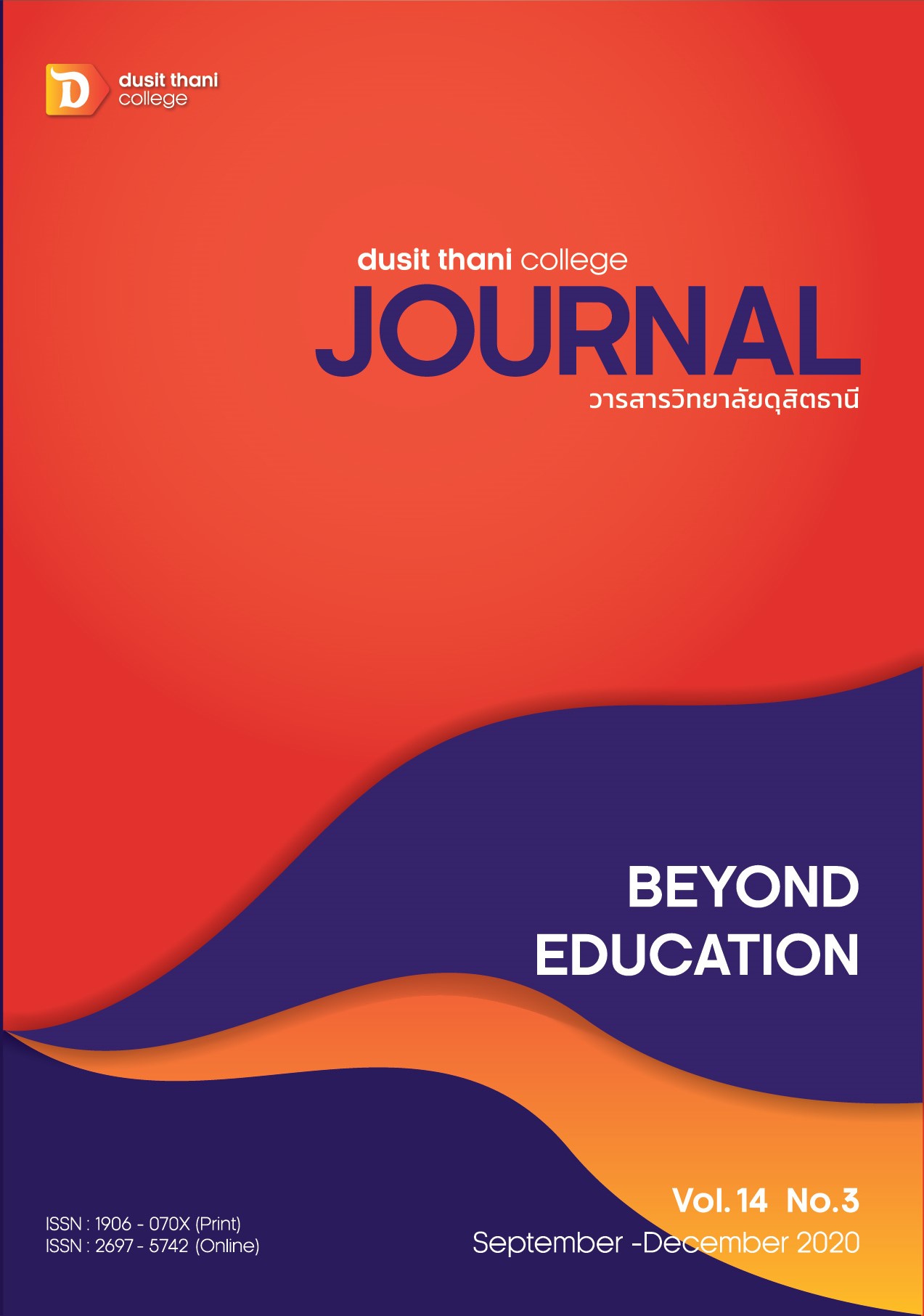The Environmental Attitudes Influence Sustainable Development and Green Consumption
Main Article Content
Abstract
Being green is a vital concept at the present to encourage environmental consciousness. Therefore, this study will clarify what are truly important in creating green consumption and sustainability in order to suggest proposals or policies on environmental management. The objective of the study investigates the relationship between environmental attitudes and sustainability and green consumption of consumer. This research is considered a quantitative based research. Finally, samples are 500 consumers in department store in Bangkok. This research employs purposive sampling to collect the data. The research tool is a survey questionnaire, asking the respondents about the environmental attitudes and sustainable development and green consumption. The reliability of the survey was determined to be Cronbach’s α = 0.782. The Pearson’s correlation coefficients are processed to analyze the collected data. The significant result of this research shows that techno-centric attitude has a positive impact on green-consumption and sustainability.
Article Details
Article Screening Policy
- All research and academic articles to be published must be considered and screened by three peer reviews in the relevant field / article.
- All articles, texts, illustrations and tables published in the journal are the personal opinions of the authors. Editors don't always have to agree. And no responsibility whatsoever is the sole responsibility of the author.
- The articles to be published must never be published. Where did you first publish? And not in the consideration of other journals If the audit found that there has been a duplicate publication It is the sole responsibility of the author.
- Any article that the reader sees as being plagiarized or impersonated without reference. Or mislead the work of the author Please let the journal editor know it will be your greatest blessing.
References
Community Development Journal, 41(1): 104-108.
Ann-Charlotte, S. & Christine R. (2006). The social construction of ‘Green building’ in the
Swwedish Context. Journal of Environmental Policy & Planning, 8(1): 67-85.
Bruun, O., & Kalland, A. (1995). Asian perceptions of nature: A critical approach.
Richmond: Curzon Press.
Campbell, E. K. (1983). Beyond anthropocentrism. Journal of the History and behavioral
Science, 19, 54-67.
Chi. N. C. (2004). A Conceptual Framework for Socio-Techno-Centric Approach to
Sustainable Development. International Journal of Technology Management and Sustainable Development, 3(1): 59-66.
Euromonitor International. (2013, December 22). Packaging Industry in Thailand. Retrieved from Euromonitor Passport GMID database.
Feifei. X., & Dorothy. F. (2014). Modelling attitudes to nature, tourism and sustainable
development in national parks: A survey of visitors in China and the UK.
Tourism Management, 45:142-158.
Guirong Zhang & Zongjian Zhao. (2012). Green Packaging Management of Logistics
Enterprises. Physics Procedia, 24, 900 –905.
Joan Martinez-Alier. (2002). The Environmentalism of the Poor. The conference on the political economy of sustainable development: environmental conflict,
participation and movements. Friday 30 august 2002 University of Wiwatersrand, Johannesburg.
Katherine V. K., & Colleen F. M. (2001). Ecocentrism and Anthropocentrism: Moral Reasoning about Ecological Commons Dilemmas. Journal of Environmental
Psychology. 21: 1-13 doi:10.1006/jevp.2001.0205
Kay, M. (1996). Environmentalism and Cultural Theory. London: Routledge.
Lorenzo Cotula. (2008). The Right to Food and Access to Natural Resources
(Introduction). FAO Right to Food Studies.
Luke Martell. (1994). Ecology and Society an Introduction. Cambridge: Blackwell.
Michael, V. R. (2008). Environmental Management Readings and Case. Thousand Oaks: Sage.
Neil Carter. (2007). The Politics of the Environment. Cambridge University press: New York.
Philip, W.S. (2007). The Environment: A Sociological Introduction. Cambridge: Polity Press
Steven Yearly. (1996). Sociology Environmentalism Globalization. Thousand Oaks: Sage.
Sundip N, Michael W, Gary G and Gary H. (2011). Simultaneous Sustainability and
Savings: Why Companies Should Invest in Sustainable Packaging, April 12, Retrieved February 1, 2014, from http://www.accenture.com/us-en/Pages/insight-simultaneoussustainability-savings-summary.aspx.
Suyong, D. (2012). Eco-Friendly Packaging in Supply Chain. The IUP Journal of Supply
Chain Management, 4(2), 7-18.
Tan B.C. & Lau T.C. (2010). Attitude towards the Environment and Green Products:
Consumers’ Perspective. Management Science and Engineering, 4(2), 27-39.
Terence, T. (2002). Corporate Environmentalism in China and Taiwan. New York:
PALGRAVE.
Timothy O’Riordan. (1976). Environmentalism. London: Pion Limited.
UN (2014). The Road to Dignity by 2030: Ending Poverty, Transforming All Lives and
Protecting the Planet. Synthesis Report of the Secretary‐General on the Post‐2015 Agenda New York, US: UN.
UN (2015). Transforming our world: the 2030 Agenda for Sustainable Development.
Resolution 70/1 adopted by the General Assembly on 25 September 2015. Retrieved from http://www.un.org/en/ga/70/resolutions. shtml.
UNEP (2015). Post 2015 Note #8: Integration and coherence key to the post‐2015 sustainable
development agenda. Retrieved from http://www.unep.org/roap/Portals/96/UNEP‐Post‐2015‐Note‐8.pdf.


